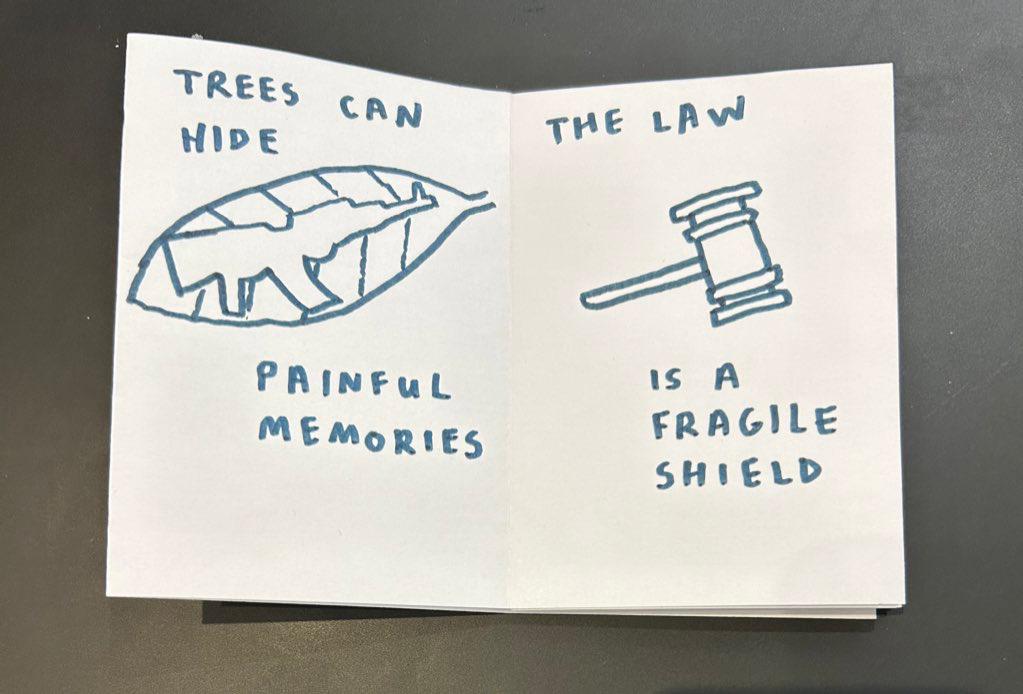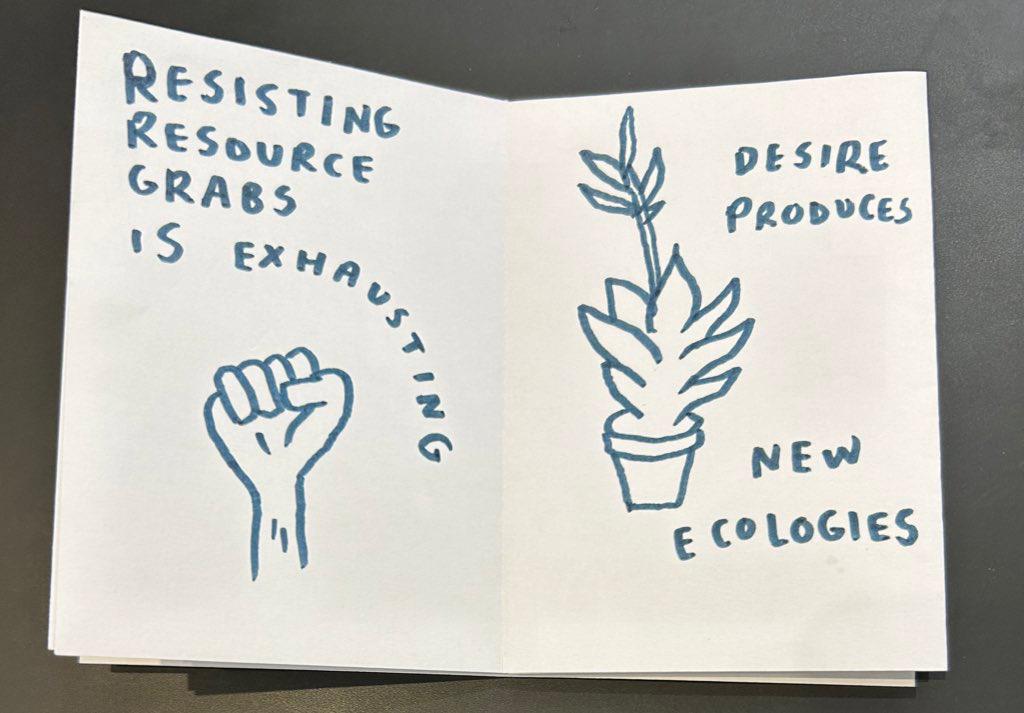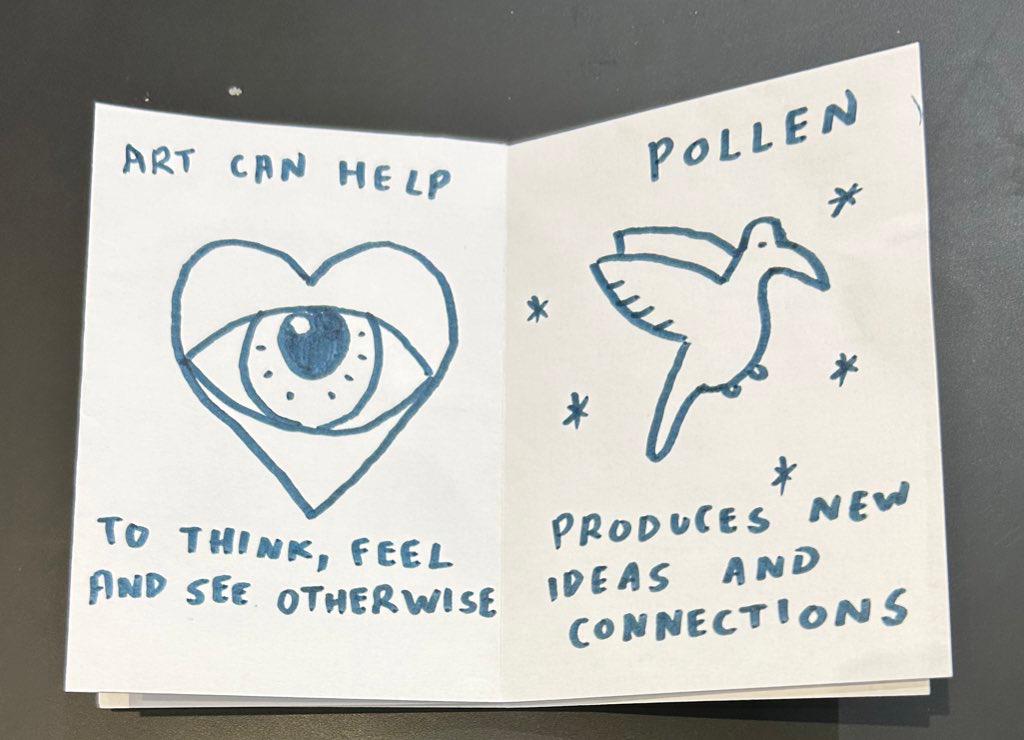How do stories and art make sense of struggles to defend and care for nature, and what does this mean for researchers and others who wish to understand and support those struggles?
This year’s POLLEN conference was in South Africa for the first time, hosted in the city of Durban by the Centre for Civil Society at the University of KwaZulu-Natal. Participants heard from activists and their allies struggling to defend lands, ecologies and communities from resource grabs, ‘development’ initiatives and exploitation.
Experiences from Durban and South Africa were shared alongside struggles from elsewhere in the world, with many common threads despite the differences.
One of these threads was the importance of stories, myths, symbols, imagery and art as ways of sustaining struggles and creating or sharing knowledge.
The exhibition at POLLEN23 included extracts from the Future Natures comics created by Tim Zocco, alongside local environmental photography from Durban, as well as a set of artworks from indigenous people who have been working with the Brazilian academic Felipe Milanez.
In the conference panels too, there were many examples of art and visual storytelling: exploring past and present traumas, fuelling hope or encouragement, or promoting visions of possible futures.
Artistic images can help us to view the world differently. But the process of creating art, in collaboration with others, also allows space for reflection, the processing of difficult experiences, or re-enchantment with familiar things. We all bring our own logic and lenses to view nature and landscapes, but art can help to think, feel and see otherwise, opening up neglected pasts, presents, futures, and relationships. Worlds that might have been, might be and might yet emerge.
Memories, land and the body
Images, symbols and stories also become crucial when speaking of memory. A panel on ‘political ecology of memory: memories of violence and socio-environmental struggles’ showed how this works in different places.
People employ stories and memories to help them reclaim or defend land. An example is the story of the Acholi people in Northern Uganda. In the panel on memory, Sara Weschler explained how people here were excluded from their land during the 1910s on the pretext of disease prevention. The episode has been obscured by a focus on more recent conflicts involving the Lord’s Resistance Army (LRA). But more long-term claims over land are validated by documents in archives, which show that people did not leave the area willingly, and continued to try to return after they were expelled from the land.
Memories can also be an ongoing source of trauma. In some post-conflict zones, forests evoke memories of soldiers hiding in trees before attacking. Here, people may value clear, open spaces for their safety. Traumas may be repeated over multiple conflicts, even distorting people’s sense of time. Conservationists entering these spaces with the desire to ‘restore’ or ‘repair’ them, no matter how good their intentions, may tread on buried memories or bitter emotions.
Memories can become embedded over time in the body. Violence against land defenders in many places is common, and the conference heard several stories of people assassinated or injured by agents of companies or governments. People in these conditions suffer sleepless nights, with threats against their property or safety, and protracted legal battles.
Resource grabbers also seek to create or exploit divisions within communities, so even close neighbours or families find themselves in conflict. Laws and constitutions can offer some protection: but how they are interpreted or enforced is slippery, often subject to negotiation, and victories require vast effort and time.
For places with resources desired by profit-seekers and the global markets that drive them, such as the lithium deposits at Barroso in Portugal, open-cast mines in Xolobeni in the Eastern Cape (and countless others), the struggle may never fully come to an end. Even when battles are won, those in search of resources will use all the means at their disposal, legitimate or otherwise, to try again and again.
In these contexts, words are not always enough. And it’s not just emotion that affects people, but bodily feelings inscribed by fear and stress over time – and yet many communities continue to fight, sustained by stories, histories and solidarities within and outside.
It is tempting to see artistic practices as a way to encounter these feelings more directly or immediately. And art can certainly speak to the heart and the senses as well as the head. But collaborative art practices also offer alternative ways to think about, and to see, situations that are not easily understood or expressible in other ways.
Ecologies in many places are sources of conflict, not only over what people want, but over their past, their future, what they value, and what things around them mean. The stories at POLLEN23 were a reminder to be alert to these conflicts and differences, and to appreciate the methods people use – whether creative, legal, academic, physical or social – to inform their struggles and envision futures in which they can thrive.
Zine: Thought-seeds from POLLEN23
I made this small booklet to process my reactions to the POLLEN conference, exploring the themes in this blog post and other ideas that I found thought-provoking.




At the conference, I was fortunate to be part of a group of ‘moles’ convened by Dan Brockington. ‘Moles’ listen into sessions and offer their reflections in the final plenary, around a set of themes selected by the group. The mini-zine draws on the observations that I gathered through the sessions I attended, as well as many smaller conversations in between.
More about POLLEN
The Political Ecology Network (POLLEN) is a global network, consisting of a large variety of political ecologists, which aims to facilitate interaction and creativity through ‘cross-fertilization’ and to promote the important field of political ecology worldwide, among academics as well as others.
The call for the next POLLEN conference, ‘Towards Plural and Just Futures’, has already been issued. It will be held in 2024 across three locations (and online). For more information, visit the conference website.